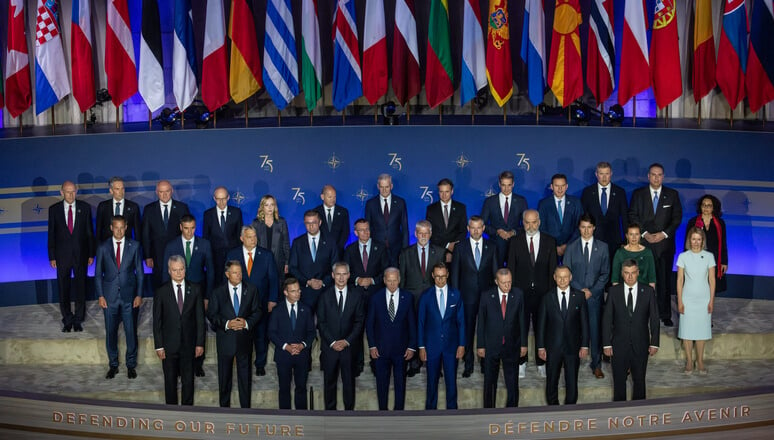There was a genuine note of optimism among the messages of congratulations that are routinely dispatched from abroad to incoming political leaders as prime minister Keir Starmer took office as head of the UK’s new Labour government.
Along with positive expressions of welcome from the UK’s former partners in the European Union, Joe Biden, facing growing doubts about his ability to pursue his own US election campaign, told Starmer he had won “a hell of a victory”.
It was as if UK’s friends and allies shared the relief of most of the British public that an era of uncertainty linked to Conservative government chaos and in-fighting was mercifully over.
EU leaders, including European Commission president Ursula von der Leyen, echoed Labour’s favoured foreign policy buzzword by welcoming the prospect of a “reset” in the relationship with the UK.
Days before Labour’s landslide victory, Starmer said he would move rapidly to reassert his country’s leading role in global affairs.
“There’s going to be a reset for the UK on the international stage,” Starmer told the Financial Times. “We will be serious about our obligations, we want to play more of a leading role on the global stage, and say that we’re back.”
Ukraine, NATO
Starmer wasted no time in reinforcing the point. The new foreign secretary, David Lammy, on his first full day in office, was dispatched to Germany, Poland and Sweden, key partners in supporting Ukraine’s military resistance to Russian aggression.
Defence minister John Healey meanwhile headed for Odesa for talks with Ukraine’s President Volodymyr Zelensky and to announce that the UK would step up a new package of defence aid.
Starmer himself joins the international top table for the first time this week at a NATO summit in Washington marking the 75th anniversary of the alliance where Russia’s war on Ukraine is high on the list of global threats dominating the agenda.
There must surely be doubts about how far a middle-ranking power confronting its own pressing domestic challenges can assume a leadership role at a time of mounting global instability
While Britain’s allies may sincerely wish the new government well, there must surely be doubts about how far a middle-ranking power confronting its own pressing domestic challenges can assume a leadership role at a time of mounting global instability.
All of the UK’s post-imperial governments have to some extent embraced the conceit, best expressed by Margaret Thatcher’s foreign secretary Douglas Hurd, that Britain “punches above its weight” in international affairs.
There remains an element of truth in Hurd’s boxing metaphor in as far as Britain continues to play a prominent role in major international institutions, from the UN Security Council to NATO, from the World Trade Organisation to the widely dispersed Commonwealth.
The missing piece
The one missing piece on this geostrategic board is, of course, the European Union which Britain quit in a 2016 referendum vote prompted, at least in part, by the then Conservative government’s desire to end divisions within its own ranks.
Although the incoming government has ruled out rejoining the EU, it has pledged to established a more positive relationship with its nearest neighbours.
Starmer will have been encouraged by statements from the likes of European Council President Charles Michel that Labour’s “historic” victory underlined the crucial partnership between Britain and the EU.
Labour government will be judged principally on how it tackles a lengthy and problematic domestic agenda by restoring public services and halting economic decline
In mid-July, Starmer will host a summit of the 47-member European Political Community, an opportunity to stamp his mark on a forum for debating issues of continent-wide concern, including the Ukraine war and energy security.
At the end of the day, of course, all politics is local. The as yet untested Labour government will be judged principally on how it tackles a lengthy and problematic domestic agenda by restoring public services and halting economic decline.
Domestic constraints
Any prospect that Britain might galvanise the sometimes faltering European response to the Ukraine crisis would rapidly fade if it failed to meet its qualified commitment to spend 2.5 per cent of GDP on defence.
Domestic constraints, if growth and productivity fail to pick up, would also limit the new government’s aspirations towards influencing the global debate on wider issues such as climate change and mass migration.
 Any prospect that Britain might galvanise the sometimes faltering European response to the Ukraine crisis would rapidly fade if it failed to meet its qualified commitment to spend 2.5 per cent of GDP on defence - NATO Summit
Any prospect that Britain might galvanise the sometimes faltering European response to the Ukraine crisis would rapidly fade if it failed to meet its qualified commitment to spend 2.5 per cent of GDP on defence - NATO Summit
Mainstream political parties elsewhere will be crossing their fingers that Labour succeeds. Europe has become a less stable place since Britain opted to abandon the EU.
Developments in France, where only an electoral alliance of convenience between left and centre halted the onward march of the far right, was just the latest symptom of the current malaise.
Add to the current scenario the prospect of Donald Trump’s return to the White House and the outlook for those who regard themselves as the sensible middle ground of politics do not look bright.
Perhaps the best favour that Britain’s new government could extend to its friends and allies would be to show that, contrary to the histrionic populist narrative, progressive consensus politics that relies less on rhetoric than on probity and hard work can still deliver the goods.